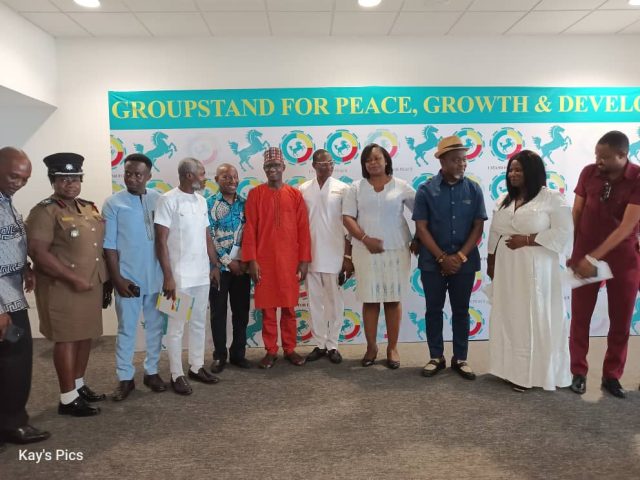Groupstand for Peace, Growth and Development has been launched to spearhead the sustainability of peace and political tolerance before, during and after the coming elections in December, 2024.
Engineer Ellis Nii Afotey Quaye, in a thought-provoking speech delivered at a forum addressing the critical issue of maintaining peace before and during elections, underscored the urgency of the matter in the context of Ghana’s political landscape.
The event, attended by various stakeholders, aimed to shed light on the escalating trend of electoral violence and its detrimental impact on the nation’s democratic process.
Acknowledging Historical Context:
Professor began by reflecting on Ghana’s political journey since the inception of the Fourth Republic in 1992.
He highlighted the relatively smooth transitions of political power between incumbent governments and opposition parties through presidential and parliamentary elections.
However, he noted a troubling pattern of electoral violence emerging in recent election cycles, posing a significant threat to the nation’s stability and progress.
Current Challenges and Concerns:
The speech addressed the alarming increase in electoral violence, which has become a pervasive issue before, during, and after elections.
Professor emphasized that no national election in Ghana has been conducted without some form of violence, with outbreaks occurring at both national and sub-national levels.
He highlighted incidents of violence during by-elections, district-level contests, and internal party activities, illustrating the widespread nature of the problem.
Relevance of the Forum:
Engineer Ellis Nii Afotey Quaye stressed the relevance of forums like the one being held, which provide a platform for dialogue and collaboration to address the deteriorating trend of electoral violence.
He emphasized the importance of discussing strategies and interventions to maintain peace and stability during the electoral process, safeguarding the integrity of Ghana’s democracy.
Call for Support and Cooperation:
In closing, Engineer Ellis Nii Afotey Quaye appealed to all attendees for their support and cooperation in ensuring the success of initiatives aimed at promoting peace during elections.
He expressed optimism that with collective effort and commitment, the nation could overcome the challenges posed by electoral violence and uphold the principles of democracy.
The speech concluded with gratitude to the audience for their attention and participation, highlighting the significance of their contributions to making the event a success.
A political science lecturer at the University of Ghana, Professor Ransford Gyampo also advocated for political tolerance and accommodation.
Professor Ransford Gyampo emphasized the critical need for political tolerance and accommodation in Ghana’s democratic landscape.
He underscored their significance in fostering a healthy and robust political environment.
He acknowledging the inherent diversity within societies, emphasizing that differences in opinion and behavior are natural, even among communities of the same ethnic origin.
Drawing parallels with the history of religions, he highlighted how attempts to enforce uniformity have often resulted in division and strife, underscoring the futility of expecting total conformity in politics.
Importance of Political Realism:
The speech delved into the concept of political realism, asserting that true democracy can only thrive when there is an acceptance of pluralism and diversity of views.
Professor Gyampo cautioned against the dangers of intolerance, noting that it often leads to violence and conflict, hindering societal progress.
Moving Beyond Mere Tolerance:
Professor Gyampo argued for a shift from mere tolerance to active accommodation, emphasizing the importance of peaceful interaction and communication between political parties.
He stressed that while individuals may hold differing opinions, they must be able to work together for the greater good of the nation, setting aside personal differences in pursuit of common objectives.
Upholding Democratic Principles:
Highlighting the constitutional guarantees of political rights and freedoms, Professor Gyampo called for a sincere commitment to free, fair, and transparent electoral processes.
He reminded both ruling and opposition parties of the temporary nature of electoral victories, urging humility and accountability in governance.
Recommendations for Political Stability:
In conclusion, Professor Gyampo offered practical suggestions to cultivate a culture of political tolerance and accommodation. These included a commitment to multiparty democracy, cooperation among political parties, and a recognition of the accountability inherent in electoral mandates.
Call to Action:
Professor Gyampo’s speech served as a rallying cry for all stakeholders to prioritize the values of tolerance and accommodation in Ghana’s political discourse.
He urged political leaders to lead by example and work towards building a nation where diversity is celebrated and democratic principles are upheld.
The speech concluded with a call for collective action to safeguard Ghana’s democratic gains and ensure a peaceful and prosperous future for all citizens.















